|
De Amerikaanse schrijver Bret Easton Ellis werd geboren op 7 maart 1964 in Los Angeles. Zie ook alle tags voor Bret Easton Ellis op dit blog.
Uit: Lunar Park
“As a writer you slant all evidence in favor of the conclusions you want to produce and you rarely tilt in favor of the truth. ...This is what a writer does: his life is a maelstrom of lying. Embellishment is his focal point. This is what we do to please others. This is what we do in order to flee ourselves. A writer's physical life is basically one of stasis, and to combat this constraint, an opposite world and another self have to be constructed daily. ...the half world of a writer's life encourages pain and drama, and defeat is good for art: if it was day we made it night, if it was love we made it hate, serenity becomes chaos, kindness became viciousness, God became the devil, a daugher became a whore. I had been inordinately rewarded for participating in this process, and lying often leaked from my writing life--an enclosed sphere of consciousness, a place suspended outside of time, where the untruths flowed onto the whiteness of a blank screen--into the part of me that was tactile and alive.”
(...)
“The heroin flowing through me, I thought about the last time I saw my father alive. He was drunk and overweight in a restaurant in Beverly Hills, and curling into myself on the bed I thought: What if I had done something that day? I had just sat passively in a restaurant booth as the midday light filled the half-empty dining room, pondering a decision. The decision was: should you disarm him? That was the word I remember: disarm. Should you tell him something that might not be the truth but would get the desired reaction? And what was I going to convince him of, even though it was a lie? Did it matter? Whatever it was, it would constitute a new beginning. The immediate line: You’re my father and I love you. I remember staring at the white tablecloth as I contemplated saying this. Could I actually do it? I didn’t believe it, and it wasn’t true, but I wanted it to be. For one moment, as my father ordered another vodka (it was two in the afternoon; this was his fourth) and started ranting about my mother and the slump in California real estate and how “your sisters” never called him, I realized it could actually happen, and that by saying this I would save him. I suddenly saw a future with my father. But the check came along with the drink and I was knocked out of my reverie by an argument he wanted to start and I simply stood up and walked away from the booth without looking back at him or saying goodbye and then I was standing in sunlight. Loosening my tie as a parking valet pulled up to the curb in the cream-colored 450 SL. I half smiled at the memory, for thinking that I could just let go of the damage that a father can do to a son. I never spoke to him again.”

Bret Easton Ellis (Los Angeles, 7 maart 1964)
De Britse schrijver en journalist Robert Dennis Harris werd geboren op 7 maart 1957 in Nottingham. Zie ook alle tags voor Robert Harris op dit blog.
Uit: Munich
“Occasionally Legat glanced across the dining room to check the entrance. Perhaps it was his imagination but it seemed that the guests and even the waiters moving back and forth across the carpet between the dusky pink upholstered chairs were unusually subdued. There was no laughter. Soundlessly beyond the thick plate glass, forty or fifty workmen, some stripped to the waist in the humid weather, were digging slit trenches in Green Park.
There should remain no doubt for the whole world at this time that it is not one man, or one leader, who speaks but the whole German people. I know that in this hour the whole people—millions strong—agree with every one of my words (Heil).
He had listened to it on the BBC as it was delivered. Metallic, remorseless, threatening, self-pitying, boastful—impressive in its horrible way—it had been punctuated by the thumps of Hitler’s hand pounding the podium and by the roar of fifteen thousand voices shouting their approval. The noise was inhuman, unearthly. It had seemed to well up from some black subterranean river and pour out of the loudspeaker.
I am grateful to Mr. Chamberlain for all his efforts, and I have assured him that the German people want nothing but peace. I have further assured him, and I emphasise it now, that when this problem is solved, Germany has no more territorial problems in Europe.
Legat took out his fountain pen and underlined the passage, and then did the same with another, earlier reference to the Anglo–German Naval Agreement:”

Robert Harris (Nottingham, 7 maart 1957)
De Duitse dichter en schrijver Jürgen Theobaldy werd geboren op 7 maart 1944 in Straatsburg. Zie ook alle tags voor Jürgen Theobaldy op dit blog
Schnitte
Die Brombeerhecken dunkeln ein,
die Schlote der Verbrennungsöfen qualmen.
Öde nenne ich die Sterne über öden Fußballplätzen
und habe vermutlich recht damit.
Wir drehen in die Nacht hinaus, denk es, o Seele,
du bist wach, wie ich, du denkst es.
Und du wirst fleißig sein, dort draußen,
auf dir den morschen Schatten des Erdballs,
der nicht schwerer wiegt
als der Schatten hier auf meinem Kissen.
Schlaf ist Opium für die Seher!
Wir treffen uns im Innern des Dschungels,
den meine Schädeldecke überwölbt:
Wieder bin ich der Himmel in der großen Faust
unsrer funkelnden Verlassenheit.
Im Zwielicht treten wir hinaus ans Meer.
Aus den Spiegeln in der Neonbar
betrachten uns Ertrunkene : Gesichter blau,
die Fischer blau, Nachtvögel blau;
um die ich weinte, weint hier keiner.
In Leipzig finden wir uns vor dem Kino ein,
ohne Rücksicht darauf, was in Leipzig so
gerade läuft. Und in China tragen wir
ein Kind auf meinen Schultern,
das von Chinas Wundern plappert,
von Feuerwerk, Teerosen, roten Drachen.
Wir verstehen jedes Wort.
Tote Fische schwimmen mit dem Strom.
Zerschossene Panzer stehen im Wasser.
Die Vorstellung schließt mit dem Nachspann,
aus der schier endlos viele Namen getilgt sind.
Mit einem Schrei fährt meine Tocher hoch
aus ihrem Dschungel: Dämonen in Kinderkleidern,
modisch rostrot, stieben auseinander.
Dämmerlicht sickert in die Büschel Gras,
die Schlote qualmen. Du Seele, ich Jane.
Die Welt dreht bei. Wir steigen aus.

Jürgen Theobaldy (Straatsburg, 7 maart 1944)
De Franse schrijver Georges Perec werd geboren op 7 maart 1936 in Parijs. Zie ook alle tags voor Georges Perec op dit blog.
Uit: Les choses
« Leurs résultats furent honorables. Ils continuèrent sur leur lancée. Ils ramassèrent un peu partout des bribes de sociologie, de psychologie, de statistiques; ils assimilèrent le vocabulaire et les signes, les trucs qui faisaient bien: une certaine manière, pour Sylvie, de mettre ou d'enlever ses lunettes, une certaine manière de prendre des notes, de feuilleter un rapport, une certaine manière de parler, d'intercaler dans leurs conversations avec les patrons, sur un ton à peine interrogateur, des locutions du genre de: "... n'est-ce pas...", "... je pense peut-être...", "... dans une certaine mesure...", "... c'est une question que je pose...", une certaine manière de citer, aux moments opportuns, Wright Mills, William Whyte, ou, mieux encore, Lazarsfeld, Cantril ou Herbert Hyman, dont ils n'avaient pas lu trois pages.
Ils montrèrent pour ces acquisitions strictement nécessaires, qui étaient l'a b c du métier, d'excellentes dispositions et, un an à peine après leurs premiers contacts avec les études de motivation, on leur confia la lourde responsabilité d'une "analyse de contenu": c'était immédiatement au-dessous de la direction générale d'une étude, obligatoirement réservée à un cadre sédentaire, le poste le plus élevé, donc le plus cher, et partant le plus noble, de toute la hiérarchie. Au cours des années qui suivirent, ils ne descendirent plus guère de ces hauteurs.
Et pendant quatre ans, peut-être plus, ils explorèrent, interviewèrent, analysèrent. Pourquoi les aspirateurs-traîneaux se vendent-ils si mal? Que pense-t-on, dans les milieux de modeste extraction, de la chicorée? Aime-t-on la purée toute faite, et pourquoi? Parce qu'elle est légère? Parce qu'elle est onctueuse? Parce qu'elle est si facile à faire: un geste et hop? Trouve-t-on vraiment que les voitures d'enfant sont chères? N'est-on pas toujours prêt à faire un sacrifice pour le confort des petits? Comment votera la Française? Aime-t-on le fromage en tube? Est-on pour ou contre les transports en commun? A quoi fait-on d'abord attention en mangeant un yaourt: à la couleur? à la consistance? au goût? au parfum naturel? Lisez-vous beaucoup, un peu, pas du tout? Allez-vous au restaurant? Aimeriez-vous, madame, donner en location votre chambre à un Noir? Que pense-t-on, franchement, de la retraite des vieux? Que pense la jeunesse? Que pensent les cadres? Que pense la femme de trente ans? Que pensez-vous des vacances? Où passez-vous vos vacances? Aimez-vous les plats surgelés? Combien pensez-vous que ça coûte, un briquet comme ça? Quelles qualités demandez-vous à votre matelas?”
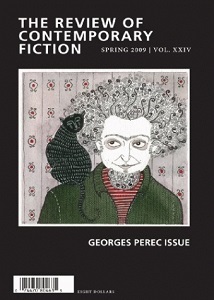
Georges Perec (7 maart 1936 – 3 maart 1982)
Cover
De Japanse schrijver Abe Kōbō werd geboren op 7 maart 1924 in Tokyo. Zie ook alle tags voor Abe Kōbō op dit blog.
Uit: The Box Man (Vertaald door E. Dale Saunders)
« Any empty box a yard long by a yard wide and about four feet deep will do. However, in practice, one of the standard forms commonly called a "quarto" is desirable. Standard items are easy to find, and most commercial articles that use standard-sized boxes are generally of irregular shape—various types of foodstuffs precisely adaptable to the container—so that the construction is sturdier than others. The most im-portant reason to use the standardized form is that it is hard to distinguish one box from another. As far as I know, most box men utilize this quarto box. For if the box has any strik-ing features to it, its special anonymity will suffer. Even the common variety of corrugated cardboard has recently been strengthened, and since it is semiwaterproof there is no need to select any special kind unless you are go-ing through the rainy season. Ordinary cardboard has better ventilation and is lighter and easier to use. For those who wish to occupy one box over a period of time, regardless of the season, I recommend the Frog Box, especially good in wet weather. This box has a vinyl finish, and as the name sug-gests, it is exceedingly strong in water. When new it has a sheen as if oiled, but apparently it produces static electricity easily, quickly absorbs dirt, and gets covered with dust; then the edge is thicker than the ordinary one and looks wavy. You can tell it at once from the common box. To construct your box there is no particular procedure to follow. First decide what is to be the bottom and the top of the box—decide according to whatever design there may be or make the top the side with the least wear or just decide ar-bitrarily—and cut out the bottom part. In cases where one has numerous personal effects to carry, the bottom part can be folded inward without cutting, and, with wire and tape, the two ends can be made into a baggage rack. Tape the ex-posed part of the edges at the three points on the ceiling and at the one on the side where they come together. The greatest care must be taken when making the ob-servation window. First decide on its size and location; since there will be individual variations, the following figures are purely for the sake of reference. Ideally, the upper edge of the window will be six inches from the top of the box, and the lower edge eleven inches below that; the width will be seventeen inches. After you have subtracted the thickness of the base to stabilize the box when in place (I put a magazine on my head), the upper edge of the window comes to the eyebrows.“
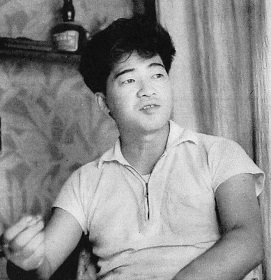
Abe Kōbō (7 maart 1924 – 22 januari 1993)
In 1954
De Duitse schrijver Reinhard Kaiser werd geboren op 7 maart 1950 in Viersen. Zie ook alle tags voor Reinhard Kaiser op dit blog.
Uit: Der kalte Sommer des Doktor Polidori
„Polidori blickte wieder auf und sah nach der Öffnung zwischen den Regalwänden. Aber da er mit dem Buch ein paar Schritte näher an das Schaufenster getreten war, durch das graues Licht in den Laden fiel, konnte er das Pult nicht mehr sehen, sondern nur einen halbhohen schwarzen Schrank voller Bücher und Papiere. Auf dem Schrank stand ein leeres Glas, darin ein silberner Löffel. Die drei Schritte, die notwendig gewesen wären, um das Pult und das Mädchen auf dem Hocker noch einmal ins Blickfeld zu bekommen, konnte Polidori nicht tun. Der Buchhändler stand ihm im Weg. Polidori klappte das Buch zu, knöpfte seinen Mantel auf und schob es in eine Außentasche seines Jacketts.
»Was bin ich Ihnen schuldig, Monsieur?«
Der Buchhändler schien von Polidoris schnellem Entschluß überrascht. Er suchte noch nach dem Preis, den sein Kunde ohne Murren akzeptieren würde.
»Fünfundvierzig Francs, Monsieur. In Anbetracht der Seltenheit dieses Werkes muß ich das verlangen.«
Für fünfundvierzig Francs bekam man hierzulande auch sechs Flaschen guten Rheinwein. Polidori bezahlte und ging rasch hinaus.
Einen Fuß vor den anderen setzen, manchmal half das. Es gab Blicke, die die fernste Ferne zwischen Menschen einfach übersprangen. Im Gehen tastete Polidori durch das Tuch seines Mantels nach dem Buch. Steif schob es sich in der Tasche hin und her, ein totes Andenken an etwas, das aufgeblitzt, aber nicht Möglichkeit geworden war und erst recht nicht Gelegenheit. Schon der zweite Blick in den hinteren Raum des Ladens hatte sich nicht ergeben wollen.
Polidori sah jetzt häufiger zurück in die Richtung, aus der er gekommen war. Vergebens. Sogar den wenigen in faltenreiche Tücher gehüllten Frauengestalten, die ihm entgegenkamen, sah er aufmerksam ins Gesicht. Polidori verlangsamte seine Schritte.“

Reinhard Kaiser (Viersen, 7 maart 1950)
Cover
De Duitse schrijver Manfred Gregor (pseudoniem van Gregor Dorfmeister) werd geboren op 7 maart 1929 in Tailfingen. Zie ook alle tags voor Manfred Gregor op dit blog.
Uit: Die Brücke
»Jawohl, Herr Unteroffi zier!«
»Los, Mann, gehn Sie, lassen Sie den Urwald roden! Möglichst Kahlschlag. Wegtreten!«
Zugegeben, Ernst Scholten hatte eine Frisur, die von einem militärischen Haarschnitt ziemlich weit entfernt war. Aber bisher hatte kein Mensch Ernst Scholten gesagt, wann er zum Haarschneiden gehen müsste. Und als er, eine Stunde nachdem er das Kasernentor passiert hatte, beim Friseur im Kasernenkeller saß, empfand er jeden Schnitt der Schere, jedes Rucken der Schneidemaschine als Schmach. Das und viele andere Kleinigkeiten, die sich im Lauf der vierzehn Tage in Ernst Scholten zusammengeballt hatten, standen jetzt im Duschraum drohend wie eine Ladung Dynamit hinter jedem Satz, den Ernst Scholten aus sicherer Deckung seinem Unteroffizier entgegenschleuderte.
Eine seltsame, spannungsgeladene Atmosphäre: zitternd, splitternackt unter der immer noch laufenden Brause, die Hände an die Oberschenkel gepresst und gar nicht mehr fröhlich, Karl Horber. Mit dem Rücken zu ihm gewandt, das Gesicht auf die sechs in der Ecke gerichtet, kalte Wut im Herzen und lauernd, Unteroffi zier Schaubeck. In der Ecke der Verein: Walter Forst, Siegi Bernhard, Albert Mutz, Jürgen Borchart, Klaus Hager und Scholten.
Die fünf um Scholten kamen immer noch nicht recht mit. Aber sie begannen zu spüren, dass hinter dieser Auseinandersetzung mehr steckte als einer der bekannten Streiche von
»Winnetou«.
Scholten hatte diesen Spitznamen schon seit Langem. Sein pechschwarzes Haar, das hagere, gelbliche Gesicht mit der jäh vorspringenden Nase und dem spitzen Kinn hatten etwas
Kämpferisches an sich. Es gab Leute, denen war Scholten vom ersten Augenblick an widerlich. Schaubeck gehörte zu ihnen.
Wie würde diese Auseinandersetzung enden? Wie überhaupt konnte sie nur enden?”
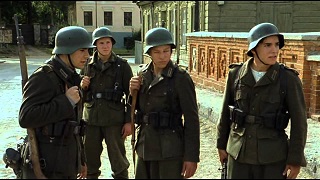
Manfred Gregor (Tailfingen, 7 maart 1929)
Scene uit de remake van “Die Brücke”, 2008
De Nederlandse dichter en schrijver Jan Frederik Helmers werd geboren op 7 maart 1767 in Amsterdam. Zie ook alle tags voor Jan Frederik Helmers op dit blog.
De Dichter (Fragment)
Zie 't ruwe menschdom: wat vertoning!
Verlaagd, verbasterd zwerft het rond,
Heeft hol of boom of klip tot woning,
En voedt met de eikels zich op d'adderrijken grond.
In woeste beestlijkheid verzonken.
Kent, voelt zijn ziel geenszins de vonken
Van 't schoon, dat ons het hart doordringt.
Beroofd van taal , kan 't slechts een rauwe noodkreet slaken ,
Als 't hongrig boschgedrocht, met opgesperde kaken,
Het als een wissen prooi bespringt.
De straal der Godheid , 's menschen reden ,
Is niets in dien gevloekten nacht;
De schrik, 't verraad sluipt om zijn schreden:
Deugd, orde en wet zijn niets; 't is al geweld en kracht.
Hebt gij , ó God van wet en orden !
Het menschdom tot dien stand doen worden?
Leeft, sterft hij als een dier en plant?
Waar toe zijn Reden dan, schoon nu nog in hem slapend',
Waarom hem niet veel eer met 's Tijgers klaauw gewapend ,
Of met de kracht van d'Elefant.
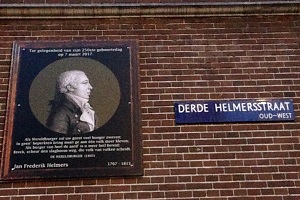
Jan Frederik Helmers (7 maart 1767 – 26 februari 1813)
Gedenkplaat in Amsterdam aan het begin van de Derde Helmersstraat
De Italiaanse dichter en schrijver Alessandro Francesco Tommaso Manzoni werd geboren op 7 maart 1785 in Milaan.Zie ook alle tags voor Alessandro Manzoni op dit blog.
The fifth of May (Fragment)
From Pyramids to heights alpine
Flashed that god's swift lightning-stroke;
From Manzares to the Rhine
Rapid, crashing thunders broke,
Rolling on from Scylla’s sea
Shaking farthest Muscovy.
Was this, glory just and true?
Sentence waits posterity.
Bow we to the Highest’s view,
Willing us in him to see
Stamped a trace more vast and grand
Of His own resistless hand.
With hurricanes of anxious joy,
Earthquake exploits of wild renown,
A heart in unsubdued annoy
In slavery gloats upon the crown;
And gains the goal and grasps a prize
'T was madness there to set his eyes.
All he tasted; glory growing
Greater after great embroil;
Flight; and victory bestowing
Palace; and the sad exile;
Twice in the dust a victim razed,
Twice on the altar victim blazed.
Vertaald door J. F. Bingham
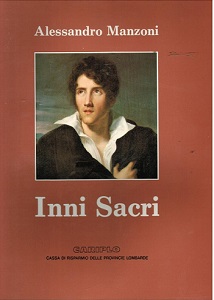
Alessandro Manzoni (7 maart 1785 – 22 mei 1873)
Cover
Zie voor nog meer schrijvers van de 7e maart ook mijn blog van 7 maart 2016 en ook mijn blog van 7 maart 2015 deel 2.
Zie voor bovenstaande schrijvers ook mijn blog van 7 maart 2007 en ook mijn blog van 7 maart 2008 en eveneens mijn blog van 7 maart 2009.
|



